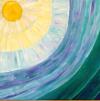It is worth reading what Tarkovsky has to say about Dovzhenko’s “noetic gardening” (as Bernard Stiegler would say, a formulation made in preference to Joseph Beuys’s “social sculpture”):
Andrei Tarkovsky, in John Gianvito (ed.), Andrei Tarkovsky: Interviews (Jackson: University Press of Mississippi, 2006), p. 21. And in another interview included in the same book, he understands this mixture of elements defining Dovzhenko’s work as a “trespassing of the border between nature and mankind”, which we can interpret in Sophoclean terms as also referring to humanity’s pantoporos aporos, its capacity for following out every path while nevertheless having no way out. Tarkovsky (in ibid., pp. 42–43):I would like to say that, if one absolutely needs to compare me to someone, it should be Dovzhenko. He was the first director for whom the problem of atmosphere was particularly important, and he loved his native land passionately. I share his love for my land, which is why I feel him very close to me. I’ll add: he made his films as if they were vegetable gardens, as if they were gardens. He would water them himself, he would make everything grow with his own hands…. His love of the land and of the people made his characters grow, as it were, from the earth itself. They were organic, complete. I would very much like to resemble him in this respect. If I didn’t succeed, I would feel mortified.
All of that said, I didn’t respond to Earth in the way that Tarkovsky – and so many others – clearly did: for me, this composition fashioned from oppositional elements was ultimately a little too dissonant, or, to put it more plainly, confused.I believe he is a genius. He created a film which I have not stopped watching over and over again to this day: that is Earth. I cannot explain why this film touches me so deeply. The film may be naïve in many ways, too schematic, rather roughly composed. But – the attention of this film is focused on the workingman who tills the land he lives on. And that surely is one of the noblest professions on earth. I probably did not express it accurately. I mean this profession ennobles people. I have lived a lot among very simple farmers and met extraordinary people. They spread calmness, had such tact, they conveyed a feeling of dignity and displayed wisdom that I have seldom come across on such a scale. Dovzhenko had obviously understood wherein the sense of life resides. And he addressed an issue that has left a lasting impression on me. This trespassing of the border between nature and mankind is an ideal place for the existence of man. Dovzhenko understood this. I think about him. Dovzhenko not only gives the impression of being a director. He is a philosopher.

